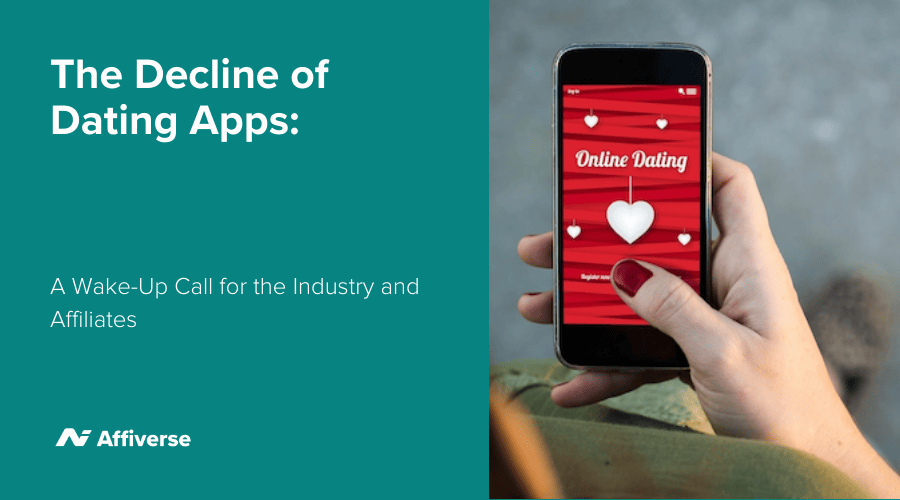The Decline of Dating Apps: A Wake-Up Call for the Industry and Affiliates

In the world of digital romance, dating apps once reigned supreme, promising to bring people together with a simple swipe.
Over the past decade, platforms like Tinder, Bumble, and Hinge revolutionised how we meet potential partners, turning what was once an awkward and time-consuming process into a streamlined, gamified experience.
But as highlighted in a recent article by The Economist, the golden age of dating apps might be drawing to a close. Users are growing increasingly disenchanted, and this shift holds significant implications for the online dating industry and for the affiliates who have long capitalised on promoting these platforms.
The Early Days: From Revolution to Saturation
When dating apps first emerged, they were seen as a revolutionary solution to the age-old challenge of finding love. They offered unprecedented convenience, allowing users to browse through potential matches from the comfort of their homes. The success stories were numerous, and the user base expanded rapidly, driving the industry to unprecedented heights.
However, as the market matured, so did user expectations.
What was once novel and exciting has, for many, become frustrating and unfulfilling. The endless swiping, which initially seemed like a fun way to explore romantic possibilities, has led to what psychologists call the “paradox of choice.” With too many options, users find it difficult to commit to one person, always wondering if a better match is just another swipe away.
This abundance of choice often leads to dissatisfaction and regret, making the search for love feel more like a chore than a joyful pursuit.
Growing Disenchantment: The Pitfalls of Gamification
One of the most significant issues users face with dating apps is the gamification of romance. Many platforms encourage a superficial approach to dating, where users judge others based on a few photos and a brief bio. This swipe culture, while initially engaging, has left many feeling disconnected and dehumanised.
The focus on quantity over quality has led to an environment where ghosting—cutting off communication without explanation—has become rampant, adding to users’ frustration and disillusionment.
Moreover, the algorithms that power these apps, while sophisticated, can create a false sense of compatibility. Users are matched based on a series of criteria that may not necessarily translate into real-world chemistry, leading to disappointing dates and unmet expectations. As a result, the promise of finding true love through a dating app is starting to ring hollow for many users.
The Market Response: Adaptation or Decline?
In response to these challenges, dating apps have tried to innovate. Some platforms have introduced features designed to slow down the process, encouraging users to take more time before swiping right. Others have added video chat options to foster more genuine connections before meeting in person.
Despite these efforts, the overall trend suggests that users are becoming increasingly wary of the effectiveness of these platforms.
The market is also becoming more fragmented. While the major players like Tinder and Bumble still dominate, niche apps catering to specific interests or demographics are gaining traction.
These smaller platforms often promise a more curated and meaningful experience, but their rise also contributes to market saturation, making it harder for any single app to maintain a dominant position.
Why This Shift Is Crucial for Affiliates
For affiliates, the changing landscape of the dating app industry is both a warning and an opportunity. The heyday of easy commissions from promoting popular dating apps may be fading as user engagement declines and market saturation increases.
Affiliates who have long relied on the success of mainstream apps may need to rethink their strategies as these platforms struggle to retain and attract users.
However, this shift also opens up new opportunities for affiliates willing to adapt. As users seek alternatives to the traditional dating app experience, there is a growing market for niche platforms that cater to specific needs or offer a more personalised approach to dating.
Affiliates who can identify and align with these emerging trends stand to benefit by promoting apps that address users’ frustrations and offer a more satisfying experience.
Furthermore, affiliates may need to focus more on content that provides value beyond simple app promotion. Educational content that helps users navigate the complexities of online dating, build meaningful connections, and avoid common pitfalls could attract and retain a loyal audience.
This approach not only builds trust but also positions affiliates as valuable resources in the eyes of their audience, leading to higher engagement and, ultimately, better conversion rates.
The Future of Online Dating and Affiliate Marketing
The decline in enthusiasm for dating apps marks a significant shift in the online dating industry. As users grow increasingly disillusioned with the swipe culture and superficial interactions, the market is ripe for innovation.
Affiliates who can recognise and respond to these changes will be well-positioned to succeed in this evolving landscape.
While the golden age of dating apps may be over, the search for love continues. For affiliates, the key to thriving in this new environment will be adaptability, a keen understanding of emerging trends, and a commitment to providing genuine value to their audience.
As the online dating world navigates this period of change, those who can pivot and innovate will find new opportunities to connect with users in meaningful ways.






